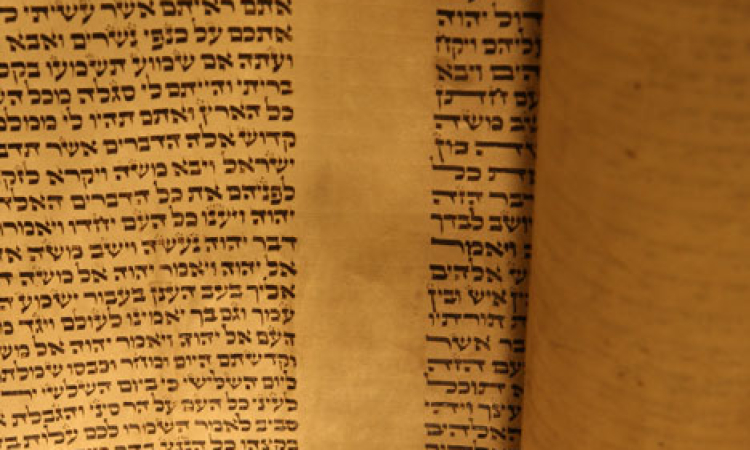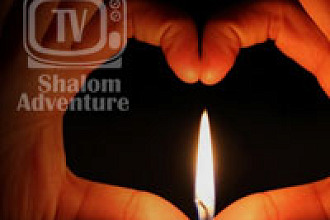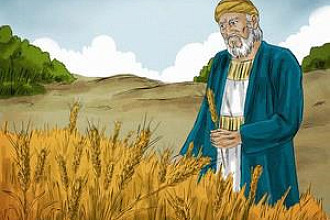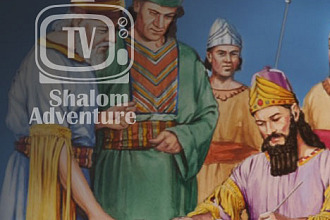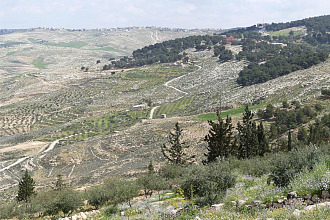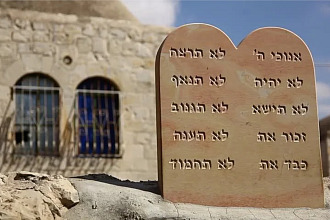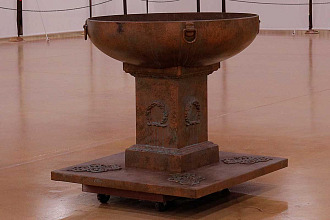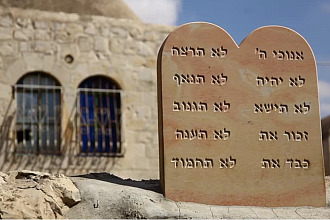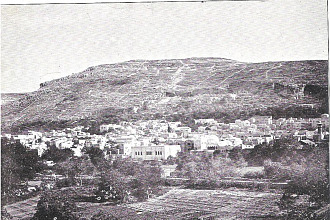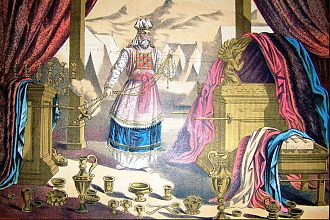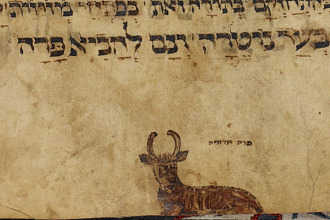Parasha for the Week: Baha’Alotcha Numbers 8:1 – 12:16
Haftara for the Week: Zechariah 2:14 – 4:7
Apostolic Writings: Mark 4:21 – 34
Overview:
Aharon is taught the method for kindling the menorah. Moshe sanctifies the levi’im to work in the Mishkan.
The levi’im replace the first-born, who were disqualified after sinning at the golden calf. The levi’im are commanded that after five years of training they are to serve in the Mishkan from ages 30 to 50; afterwards they are to engage in less strenuous work. One year after the Exodus from Egypt, G-d commands Moshe concerning the korban Pesach. Those ineligible for this offering request a remedy, and the mitzvah of Pesach Sheni is detailed, allowing a “second chance” to offer the korban Pesach one month later. Miraculous clouds that hover near the Mishkan signal when to travel and when to camp. Two silver trumpets summon the princes or the entire nation for announcements.
The trumpets also signal travel plans, war or festivals. The order in which the tribes march is specified.
Moshe invites his father-in-law, Yitro, to join the Jewish people, but Yitro returns to Midian. At the instigation of the eruv rav — the mixed Egyptian multitude who joined the Jewish people in the Exodus — some people complain about the manna. Moshe protests that he is unable to govern the nation alone. G-d tells him to select 70 elders, the first Sanhedrin, to assist him, and informs him that the people will be given meat until they will be sickened by it. Two candidates for the group of elders prophesy beyond their mandate, foretelling that Yehoshua (Joshua) instead of Moshe will bring the people to Canaan. Some protest, including Yehoshua, but Moshe is pleased that others have become prophets. G-d sends an incessant supply of quail for those who complained that they lacked meat and a plague punishes those who complained. Miriam tries to make a “constructive remark” to Aharon that implies Moshe is only like other prophets. G-d explains that Moshe’s prophecy is superior to that of any other prophet, and punishes Miriam with tzara’at because she gossiped about her brother. Moshe prays for her, and the nation suspends travel until she is cured.
"FIRST PASSOVER CELEBRATION AFTER THE EXODUS"
It is important to remember that the Torah is not written in exact chronological order. Jewish tradition even says there is no “before” or “after” in the Torah. However there are some dates given in the Torah. The first verse of chapter 9 in parasha Beha’alotcha says, “Hashem spoke to Moses in the Sinai wilderness in the first month of the second year after they had come out of the land of Egypt, saying,” (Numbers 9:1). Those who are attentive to their reading will remember that the first verse of Bemidbar says: “In the wilderness of Sinai, on the first day of the second month in the second year from the Exodus from the land of Egypt, Hashem spoke to Moses in the Tent of Meeting, saying,” (Numbers 1:1). While chapter 9 says they are in the first month of the second year, chapter 1 says it was the second month of the second year. It seems this verse in chapter 9 wants to tell us about something that happened in the wilderness one month before the great census of Israel that is recorded in Bemidbar. Also, this last date given in chapter 9 is almost the same as the one given in the 40th chapter of Exodus: “Now it happened during the first month of the second year, on the first day of the month, the Tabernacle was raised up.” (Exodus 40:17). The main difference between Exodus 40:17 and Numbers 9:1 is that Exodus 40:17 specifies that this is on the first day of the first month, while Numbers 9:1 simply says it was the first month, but does not give the precise day. However, very soon we will be able to guess which day of the month it was.
Let’s look at the context of chapter 9 of Numbers. The people of Israel stayed a long time in the wilderness in order to build the sanctuary according to the specifications given to Moses by G-d. In Exodus 40:17 they are still at the foot of Mount Sinai. When they reached the first month of the second year, it was time to erect the sanctuary, and it was on the first day of the month. The people of Israel had the sanctuary erected in this place of the wilderness for one month, until the second month mentioned in Numbers 1. During that month the instructions in book of Leviticus, which comes between Exodus and Numbers, were given to the cohanim so they would know how to use the sanctuary and how to perform the Mishkan services. Not only that, during that same month the sanctuary was dedicated, the priest Aharon and his sons were ordained, and the service of Yom Kippur was explained to them. And only after that month was completed did G-d order Moses to take the census.
However something happened in the middle of the first month, and this is recorded in chapter 9 of Numbers. Before they departed from this place, since it is was the first month of the year, that means the month of Nissan, G-d ordered Israel to celebrate Passover: “Hashem spoke to Moses in the Sinai wilderness in the first month of the second year after they had come out of the land of Egypt saying, ‘Bnei-Yisrael is to observe Passover at its appointed time. You are to celebrate it at its appointed time, at twilight on the fourteenth day of this month, with all its rules and regulations.’” (Numbers 9:1-3). This means if in Exodus 40:17 we were on the first day of the month, now we are close to the 14th of Nissan, in the evening, when Passover begins. That is why the text continues, “So Moses told Bnei-Yisrael to observe Passover. They celebrated Passover at twilight on the fourteenth day of the first month in the Sinai wilderness. In accordance with all that Hashem commanded Moses, so Bnei-Yisrael did.” (Numbers 9:4-5). It was important to not miss this appointment with G-d, because if in the wilderness, while they are in the direct presence of G-d, they would not follow the law of celebrations, that would be a bad example for the people of Israel in the Promised Land. Thus it was crucial for Israel to celebrate Passover in the wilderness, and since we are in the second year, it was the first celebration of Passover after the famous night of the 10th plague, where the first-born of Egypt died. Here it is important to emphasize that even today Jews never rejoice in the death of their enemies—they always remember that each human being has been created in the image of G-d and all are brethren participating in the same humanity. That is why, even today, the day before Passover is called the Fast of the First-born. It is a day of fasting only for the first-born among Israel: every first-born is to fast in remembrance of the first-born of Egypt who died on that day. Before experiencing the joy of the message of salvation contained in Passover, they express their sadness about the death of the first-born of Egypt.
According to Jewish tradition, the Jewish people were exempted from the fulfillment of some commandments in the wilderness: two of these commandments were circumcision and the celebration of Passover; that is why these two institutions were reinstated after crossing the Jordan River and arriving in the Promised Land. We read in Joshua 5: “Now this is the reason why Joshua circumcised: all the people that came out of Egypt who were males—all the men of war—had died in the wilderness along the way after they came out of Egypt. Though all the people that came out were circumcised, none of the people who were born in the wilderness along the way as they came out of Egypt had been circumcised” (4-5), and since they crossed the Jordan River in the first month, “they observed Passover on the evening of the fourteenth day of the month in the plains of Jericho. On the day after the Passover, on that very day, they ate of the produce of the land, matzot and roasted grain.” (Joshua 5:10–11). The miraculous daily supply of manna stopped on that day.
"PESACH HASHENI OR SECOND PASSOVER"
Right after reading that the people of Israel celebrated Passover in the wilderness at Sinai, we learn that some Israelites came to Moses with a special request: “However, there were some men who could not celebrate Passover because of being defiled by a dead body. So they came to Moses and Aharon on that same day, and these men said to him, “We have become unclean because of a dead man’s body. Why should we be kept from presenting the offering of Hashem at the appointed time with the rest of Bnei-Yisrael?” (Numbers 9:6-7). This case was unexpected, that is why Moses had no answer for them and said: “Wait, and I will inquire what Hashem commands concerning you.” (Numbers 9:8). G-d answered: “Say to Bnei-Yisrael saying: If any man, whether you or your descendants, becomes unclean because of a dead body, or is away on a long journey, he may yet observe Hashem's Passover. They are to celebrate it at twilight on the fourteenth day of the second month. With matzot and bitter herbs they are to eat it.” (Numbers 9:10-11). G-d is so gracious toward His people that He is ready to accommodate even the date of the celebrations of the feasts, and here in this case a second Passover was installed on the 14th day of the second month. This rule is applied even today—every Jew knows that the 14th of the month of Iyar is Pesach Hasheni or the Second Passover. If for some reason Jews are unclean on the 14th of Nissan and they cannot celebrate it, the law allows them to celebrate Passover one month later, in the month of Iyar.
Haftarah: Zechariah 2:14 - 4:7
Chapter 3 of Zechariah is about human nature: Joshua HaCohen is the spiritual leader of Israel, he is coming from Babylon to help his people, the Jews, to rebuild the holy city of G-d; but as do many leaders, he asks himself if he is good enough, if he deserves this privilege to be the spiritual leader of G-d’s people. When we start to doubt, there is always someone who will try to confirm our doubts, and that is the enemy of G-d and of the human race: the satan, the adversary. He is the one who always opposes G-d and His people; but if satan is there, the great defender of G-d’s people is there too: “Then he showed me Joshua the kohen gadol standing before the Angel of Hashem, and the satan [adversary, accuser] standing at his right hand to accuse him.” (Zechariah 3:1). The Angel of Hashem is this special angel who is “like G-d.” We have already spoken about this Angel who appeared to Abraham in Genesis 18, to Moses at the burning bush in Exodus 3, and to Manoach’s wife to announce the birth of Samson in Judges 13. This Angel is presented in Daniel 12 as the great angel Michael: “At that time Michael, the great prince who stands guard over the sons of your people, will arise.” (Daniel 12:1). When it is said to the prophet that this angel “stands guard over the sons of your people,” that means he is the defender of G-d’s people, exactly like the Angel of Hashem in Zechariah 3. We note that this angel bears a very special name: Michael. This Hebrew name מִֽיכָאֵ֜ל can be broken down into three parts: Mi, Kha, El which translate as: Mi = “who”, Kha = “as” or “like”, and El = “G-d”—therefore the literal translation of “Michael” is “who is like G-d.” This means that the prophet Daniel reveals to us the name of the Angel of Hashem who led Abraham, Isaac, Jacob, and the people of Israel in the wilderness: “Behold, I am sending an angel before you, to guard you on the way and to bring you into the place that I have prepared. Watch for Him and listen to His voice. Do not rebel against Him because He will not pardon your transgression, for My Name is in Him. But if you listen closely to His voice, and do everything I say, I will be an enemy to your enemies and an adversary to your adversaries. For My angel will go before you.” (Exodus 23:20-23). This angel is very special since the Name of Hashem is in him and he has the power to forgive our sins. We previously knew about this angel, but now we have his name: Michael.
The satan is standing there and he is accusing Joshua, but the Angel of Hashem is there to defend him: “Hashem said to the satan, ‘Hashem rebukes you, the satan. Indeed Hashem, who has chosen Jerusalem, rebukes you. Is not this man a brand plucked out of the fire?’” (Zechariah 3:2). Many times, even though it is the Angel who is speaking, the text identifies this Angel with YHWH, translated here as Hashem. Joshua is certainly not perfect, he is a sinner like all humanity, but he has the favor of G-d. He has come through many hardships and trials and is “a brand plucked out of the fire”—that means he has suffered enough.
The sins of Joshua HaCohen are symbolized by his garments: “Now Joshua was wearing filthy garments” (Zechariah 3:3)—very dirty garments: “filthy.” But the Angel of Hashem is there, “who answered and spoke to those standing before him saying, ‘Remove the filthy garments from him.’ Then to Joshua he said, ‘See, I have removed your iniquity from you and will dress you with fine clothing.’” (Zechariah 3:4). This change of clothing into new garments symbolizes Joshua’s cleansing and salvation: “For He has clothed me with garments of salvation,” (Isaiah 61:10). Then we have an exhortation to follow G-d’s instructions: “Thus says Hashem-Tzva’ot, ‘If you will walk in My ways and keep My charge, then you will judge My House and watch over My courts and I will give you a place to walk among these standing here.’” (Zechariah 3:7). G-d’s requirement is always the same: to be faithful to Him.
Apostolic Writings: Mark 4:21-34
The first instruction given in our parasha Beha’alotcha is about the Menorah (Numbers 8:1-2), (the seven branched candelabra). Aharon is taught how to light the Menorah, how to place it in the Holy Place of the Tabernacle and how to take care of it.
In our Besorah (gospel) written by Mark, Yeshua gives a great lesson about the Menorah by asking a great question: “Is a lamp put under a basket or a bed? No, shouldn’t it be placed on a lampstand?” (Mark 4:21). Will his message always be a secret? Hidden from the many and revealed only to the few? Lamps are meant to give light, not to hide it. Remember that Yeshua said to his talmidim, “You are the light of the world.” (Matthew 5:14). One day G-d’s kingdom will be plain to all.
Yeshua’s disciples cannot hide themselves and yet claim to be disciples and believers in Yeshua, even though it is risky to confess that Yeshua is the Messiah of Israel. “Therefore whoever acknowledges Me before men, I will also acknowledge him before My Father who is in heaven. But whoever denies Me before men, I will also deny him before My Father who is in heaven.” (Matthew 10:32-33). Yeshua must be proclaimed, because that is the mission Yeshua gave to his disciples.
Light is one of the most common symbols in the Bible: G-d is a light for us (Psalm 27:1); Aharon was to teach Israel that each believer is a light; according to Isaiah, Israel is to be a light among the nations (Isaiah 42:6). Yeshua was the true light coming to this world (John 1:4), therefore he sends each of his disciples as a light to the world to testify about him. This has always been the teaching of the prophets. Isaiah said: “Arise, shine, for your light has come, and the glory of the L-rd has risen upon you.” (Isaiah 60:1). G-d has called His people to illuminate the world with His word by sharing our knowledge of G-d’s word.
This sharing is also about the goodness and the great love of G-d for the world, even though ours is a world of violence and struggle. G-d loved this world so much that He gave His “Son” (Yeshua) in order to save us.
Yeshua continues, “For there is nothing hidden that will not be revealed, nor anything kept secret except that it would come to light. If anyone has ears to hear, let him hear.” (Mark 4:22-23). Yeshua taught in parable and allusion because these messages were given for the disciples who were able to understand some of these teachings. Although they did not immediately understand all of these sayings, later, when they were immersed in the Ruach Hakodesh, these words of their master would come back to their minds and then they would be able to fully understand them.
Yeshua’s teaching is very important here, and he underlined his lesson by saying: “If anyone has ears to hear, let him hear.” This declaration was intended to call the attention of the disciples to his words. His lesson is that everything will one day come to light, nothing will be permanently hidden, neither good nor evil. From time to time we might do something, thinking that nobody is watching, but that is a mistake—there is always someone who is watching, and that is G-d: He is always present. This is the meaning of the kippa Jews wear permanently. Having the kippa above their head reminds them that G-d is above them and is permanently present.
Teaching in parables was not an innovation by Yeshua—this kind of teaching was already present in the Hebrew Bible. The greatest parable given in the Hebrew Bible is the Sanctuary. Each piece of its furniture, the Menorah included, was given to Israel as a great parable explaining the reality of the kingdom of G-d and G-d’s plan of salvation.
Throughout the Besorah of Mark, Yeshua taught his disciples through parables. In our portion we have two more vivid parables of spiritual growth: “The kingdom of G-d is as if a man should scatter seed on the ground. He sleeps and rises night and day, and the seed sprouts and grows; he knows not how.” (Mark 4:26-27). This parable of the good seed shows the manner in which the kingdom of G-d makes progress in the world. We do not need to be anxious and struggle: the seed will bear fruit of its own accord. It will grow on the earth by the action of the Ruach Elohim. We don’t know how, and we don’t understand the process of spiritual growth, but it will grow. It is like the growth of a natural plant—any gardener will affirm that he does not understand the process of this natural growth, but it grows. It is the same in the spiritual world: we have just to spread the word of G-d, and then to pray, and to sleep very well because “night and day” the Ruach Hashem is working to instill these words in the hearts of our hearers and they will grow. But we have to be patient, for the growth is gradual: first the blade; then the ear; after that the full corn in the ear (Mark 4:28), all for the glory of G-d and His kingdom.
Then comes another comparison, “It is like a grain of mustard seed, which, when sown on the ground, is the smallest of all the seeds on earth, yet when it is sown it grows up and becomes larger than all the garden plants and puts out large branches, so that the birds of the air can make nests in its shade.” (Mark 4:31-32). The lesson here is about the silent, almost unnoticed growth of the tiniest seed, the mustard seed. This seed is so small we don’t understand how it can grow, but in time it grows into a bush that is one of the biggest plants in the Near East.
The movement of Yeshua started very small, with only 12 men, but it will become so large that the kingdom of G-d will grow from such insignificant beginnings to its final triumph. G-d’s kingdom will be full of men and women from Israel and every other nation. That was a great encouragement for the disciples—they were only a few, but then they experienced exponential growth. From the 12 they grew to 120 in Acts 1, then to 3,120 in Acts 2, then to 5,000 in Acts 4, and then they could not be numbered but are called a “multitude.” (Acts 4:32 NKJV). Even though their message was very new in most of the countries where they traveled, even though they were persecuted, they immersed multitudes of people who accepted the G-d of Israel, the Bible of Israel and the Messiah of Israel, even though this began in a very tiny nation in the great Roman Empire. This success and growth is a great encouragement for us, too. Even though we are very small, even though our Jewish Adventist congregations are small, as we are courageous and continue to spread the words of our Messiah among Jews and Messianics, Hashem will bless this ministry and will help our congregations grow.
Yeshua was a good teacher who taught those who were able to understand. But as it is said in the last words of this text, Yeshua taught much more than what we have in the Besorah: “With many such parables He used to tell them the word, as much as they were able to hear.” (Mark 4:33).

